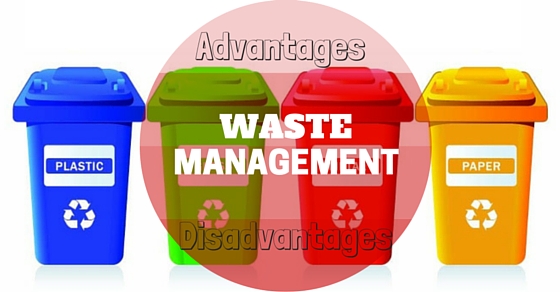What is Waste Management?
The term ‘Waste Management’ collectively means the management of waste from its inception to the final stage of disposal. Thus, as one single unit, it encompasses right from the collection, disposal, recycling, to which the processes of monitoring and regulation, respectively belong to, along with the legal frameworks that enable the occurrence of waste management.
According to Wikipedia
“Waste management or waste disposal are all the activities and actions required to manage waste from its inception to its final disposal. This includes amongst other things collection, transport, treatment and disposal of waste together with monitoring and regulation. It also encompasses the legal and regulatory framework that relates to waste management encompassing guidance on recycling.”

Okay… but what do we mean here by ‘waste?’
We all attribute the term ‘waste’ in a global manner to a number of wastes. All kinds of wastes, right from the municipal waste to agricultural waste to hazardous residues and special wastes such as sludge, health care wastes come under one umbrella. Though all of them are certain waste products, their management practices are not the same.
In fact, the management practices of developing and underdeveloped countries are far more different from the practices done in the developed countries, as these countries use state of the art facilities when it comes to the aspect of waste disposal methods.
Types of Waste Management:
- Landfills
- Incineration/Combustion
- Recovery and Recycling
- Plasma gasification
- Composting
- Waste to Energy (Recover Energy)
- Avoidance/Waste Minimization
Why Waste Management is Important?
- Its Protects the environment
- Recycling helps you to get money
- Reduces all types of waste
- Saves the earth and conserves energy
How Did ‘Waste Management’ Emerge?
We, humans, are always practicing some primitive and most basic waste management methods and techniques since our inception thousands of years ago. The primal humans used holes dug in sands manually to bury their faecal matter along with burying the waste products. This was done to ward off the rodents and rats and other animals which thrived on waste products and also caused a lot of diseases spread in humans.
As days developed and flew, the practices we followed too started getting modernized and enhanced. Bio-degradation started developing rapidly and many of the wastes became non-bio-degradable for which an alternative method needs to be followed. These practices were modified according to every country’s needs and values, thereby developing unique frameworks for each.
For example, take the aspect of composting. Right from the food scraps that are left out of our every day’s food like eggshells, bread crumbs, etc., a compost pile is formed and these wastes are collected in an aggregate manner.
Along with these organic wastes other green products like grasses, vegetable remains are added in the right proportions to form the vermicompost, which is excellent manure. This is one of the finest examples we can attribute to waste management recycling.
Let us now have a look at some techniques which are used in the waste management process before discussing its merits and demerits.
Hierarchical Process:
This hierarchical process has 3R’s to it, namely, Reduce, Reuse and Recycle. This process denotes the favourability of the three processes according to a pyramid. Here it is seen that the process of minimization is preferred than the other two.
Hence, this minimization process can be called as the cornerstone of all the waste management strategies or methods of waste management, by this the basic principle is that all the generated residues should be utilized to the maximum and only a minimal amount of waste should be generated. This minimal waste, utilizing suitable techniques, should be resourcefully reused through some other viable channels.
Now, the resultant residue after the reuse should be thoroughly checked for the possibilities of recycling and if so, must be recycled properly and completely. If not, care must be taken to dispose of them in an eco-friendly manner or use them for obtaining any biofuel.
Comparison Table:
| S.no | Advantages | Disadvantages |
| 1 | Practice is highly lucrative | Process is not always cost-effective |
| 2 | Keeps the environment clean and fresh | The resultant product has a short life |
| 3 | Saves the Earth and conserves energy | Needs More Global Buy-In |
| 4 | Reduces environmental pollution | The sites are often dangerous |
| 5 | Waste management will help you earn money | Practices are not done uniformly |
| 6 | Creates employment | Waste management can cause more problems |
Advantages or Benefits of Waste Management:
As mentioned above, waste management involves the collection and disposal of both hazardous and non-hazardous wastes from all the sectors of society. We shall now look in detail the advantages of waste management or the benefits of proper garbage disposal.
1. This practice is highly lucrative:
The Journal of Waste management says that the revenues generated by the waste management would top by $60 million by 2018. But, there are only a few people who sincerely consider this as an industry into various facets of waste management like recycling and reusing, and reap the benefits.
Now many companies are looking forward to associating themselves with this industry and are ready for a long term investment.
2. Keeps the environment clean and fresh:
Perhaps, the greatest advantage of waste management is keeping the environment fresh and neat. These waste disposal units also make the people go disease-free as all the resultant wastes are properly disposed and taken care of.
More number of waste disposal units can be placed in all the tier-1 and tier-2 cities so that the waste disposal process can be prepped up. Also a point worthy of our consideration here is that this advantage can be taken into account only if extensive and proper safety measures are implemented along with proper waste disposal techniques.
There is no use in simply implementing a half-baked technique which, if no use to both the people and the environment. This is the best effects of proper waste disposal.
3. Saves the Earth and conserves energy:
This characteristic of waste management includes specifically the recycling aspect. As recycling of waste helps in reducing the cutting down of trees. This cutting of trees is mainly done for the production of paper. Though the paperless office is the new trend that is practiced widely but with the help of recycling we can conserve energy and lower the consumption of earthly resources.
By using this method, we can use recycled waste to make quality papers rather than relying on trees. Also, recycling needs only a minimal amount of energy for utilization and complete processing. The resultant product we obtain is a renewable source of energy and is eco-friendly.
4. Reduces environmental pollution:
As explained above, waste management if done in a proper manner not only eliminates the surrounding waste but also will reduce the intensity of the greenhouse gases like methane, carbon monoxide which is emitted from the wastes accumulated.
The depth of the existing landfills and incineration will be curbed, thereby cutting down the harmful factors that affect the environment.
5. Waste management will help you earn money:
Can you believe if I say that what I have said above is absolutely true?
Yes, waste management earns you a few extra bucks every month. Actually, there are many companies which will pay you for your waste.
Right from old and used bottles to tin cans and e-wastes, all kinds of wastes are collected and paid. These wastes are then segregated according to the extent of pollution they cause to the environment and these wastes are recycled accordingly for various purposes.
There are also crash courses available which will aid you to reuse your trash. Above all, by following this method, you can create an awareness to your fellow people by earning money, which is a win-win concept.
6. Creates employment:
Again, this aspect too is unbelievable for you… right?
You may even ask how come this is possible? But in all the facets of waste management, a huge amount of labor is needed. Right from the collection to the final step of segregation, every phase needs manpower and ultimately a large number of employment opportunities get opened up.
This claim is evident from the labour statistics provided by the US government, according to which around 3.1 million new jobs are produced due to the waste management factor.
Disadvantages of Waste Management:
We have now seen the merits of waste management in detail. Let us now have a look at the disadvantages also.
1. The process is not always cost-effective:
Yes, though it may pay cash to the contributors, the truth is this process needs a lot of money, time and land to set up a plant and run. As the amount of waste that is being contributed to the waste product unit increases, so are the number of plants that process these resources.
Setting up a huge factory obviously needs a lot of money, and this management will start fetching yields only in the long run. Hence, this is not seen as a short-term lucrative investment.
While dumping more and more garbages in the landfills cause only $50 per ton, recycling them in the proper manner will cause $150 per ton, which is exactly triple the cost and thus many of the companies tend to switch over to the landfill method itself.
2. The resultant product has a short life:
This is also true since the resulting recycled product cannot be expected to have a durable quality. As the product itself has its origin from the remains of the other trashed waste products and heaps of partially used ones.
The recycled product, though, is eco-friendly is expected to have a shorter life span than the intended original one.
3. The sites are often dangerous:
As the waste management sites include the landfills to recycling units under its aegis, these sites are highly susceptible to fungal and bacterial growth thereby leading to various diseases.
Even the debris formation will be accelerated by such bacterial growth, which makes it totally unsafe for the workers who work there. It also causes widespread pollution and releases harmful chemicals. These chemicals, when mixed with drinking water or any other consumable item pose a high amount of danger to human health.
4. The practices are not done uniformly:
Still, a large scale of these waste management practices are done only as a small scale process and is mostly confined to residential homes, schools, and colleges and is not practiced in a uniform manner in large industries and conglomerates.
It is not even practiced globally, as the global level consists of curbing oil spills, ocean disposals and decreasing the tree felling.
5. Waste management can cause more problems:
Though waste management creates employment, it only has the ability to produce low-quality jobs. These jobs include right from sorting the garbage collector to the intensive and laborious jobs that are needed in the factories and outlets.
Daily basis collection of garbages will make the streets look unpleasant and unhygienic leaving excess debris on the streets to rot up. Even after the successful completion of the final stage, many chemical stews will be left behind which needs to be properly and completely disposed, otherwise, they will also pose a threat to the environment which makes the ultimate purpose of waste management go redundant.
Also, in the areas where these management units are present, it is noticed that the groundwater gets affected. So, it too causes a considerable extent of water pollution and land pollution.
Around 38% of Americans regularly depend on #groundwater for their drinking water. Also, 90% of US freshwater supply is groundwater. Share on XThus, considering the pros and cons of waste management, we can only realize that the ultimate goal of waste management relies on waste minimization and curbing only. However, the aspects of recycling and processing wastes cannot be omitted since they attribute an environmental flavor to our area of study.
It also makes the whole process to be economically viable and increase the sustenance of the process thereby making it less susceptible to the legal frameworks and conventions of each country. The energy flow from the producers to the consumers must be retained as it is in the original ecosystems and the recycling should work in tandem with the generalities of nature.
Thus, not even a single aspect can be deleted from the whole process. At the same time, the process too cannot be stopped by considering the demerits alone. It should be implemented step by step and should move from a small scale industry to a larger one, thereby eliminating the problems which arise in the midway by finding suitable strategies and solutions for the problems.
The government too should support the practices by easing the rules and encouraging all its citizens to practice the same in their households and can also provide a reward for those who practice these measures in an effective manner.
Methods like vermicomposting, generating energy from solar cells and e-wastes, using the recycled water for household practices can be easily preached to the commoners in a simple way to follow. This will aid and enhance the fertility of our soil, reduce environmental pollutions, increase the groundwater level ultimately making our environment a safe haven to live. This will be the real legacy we have to leave behind for the forthcoming generations.




































